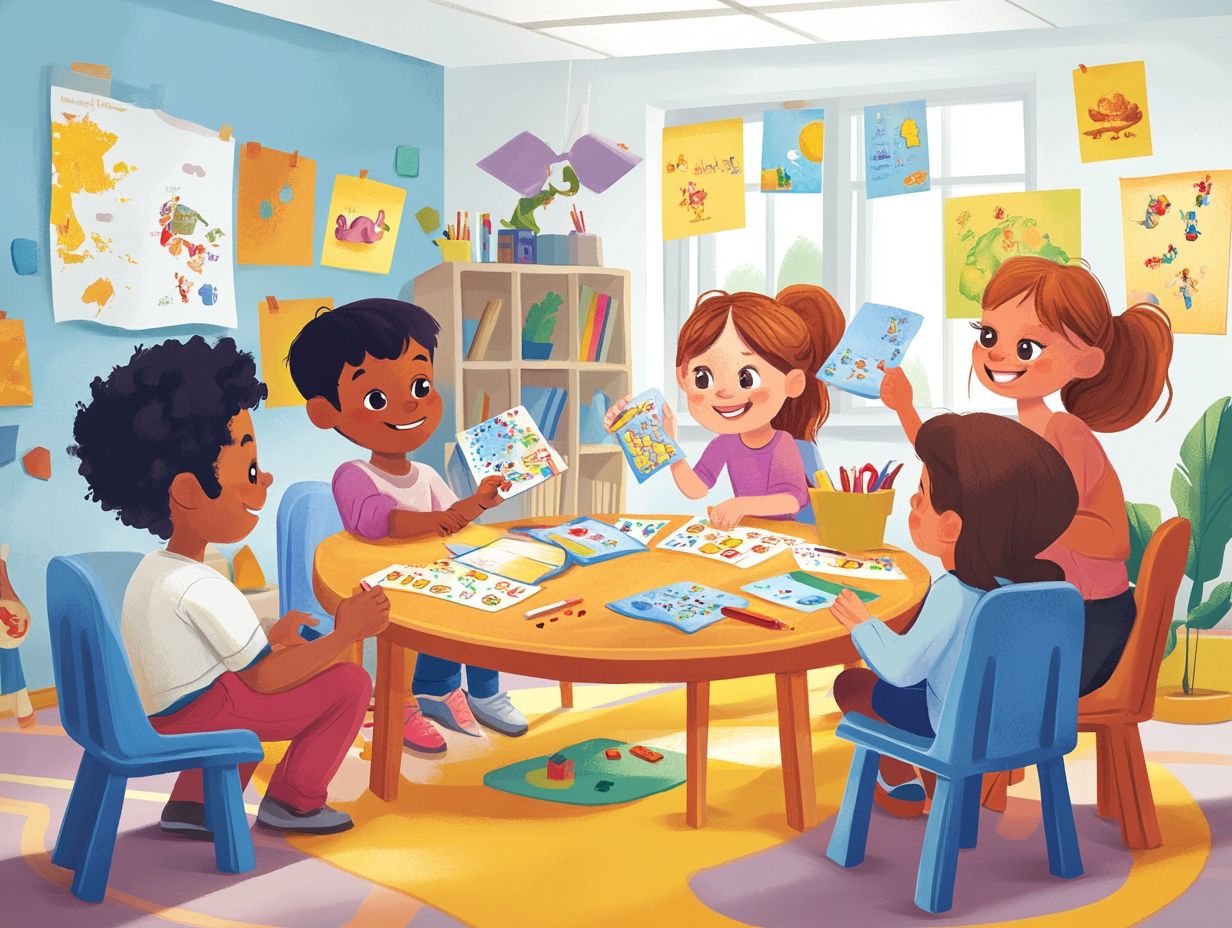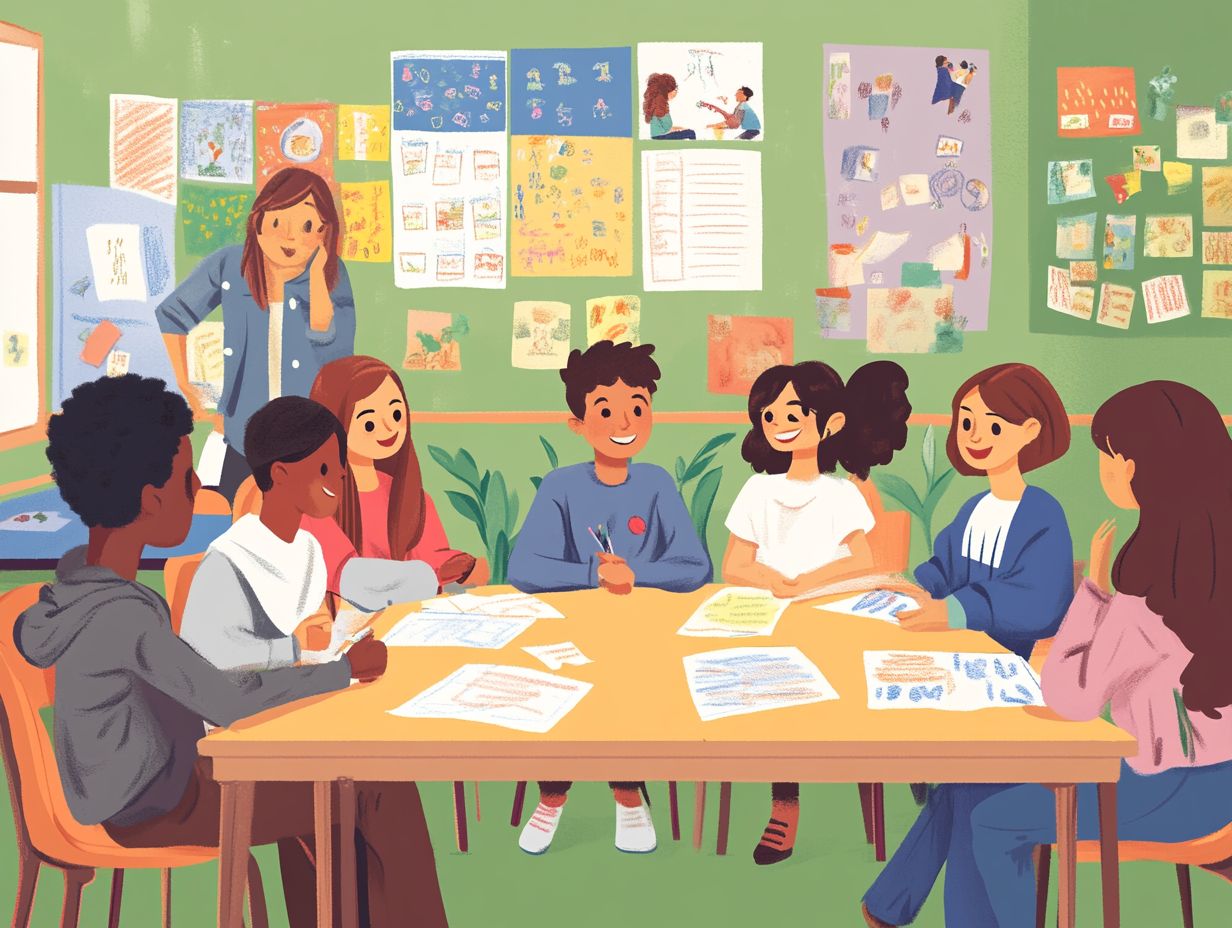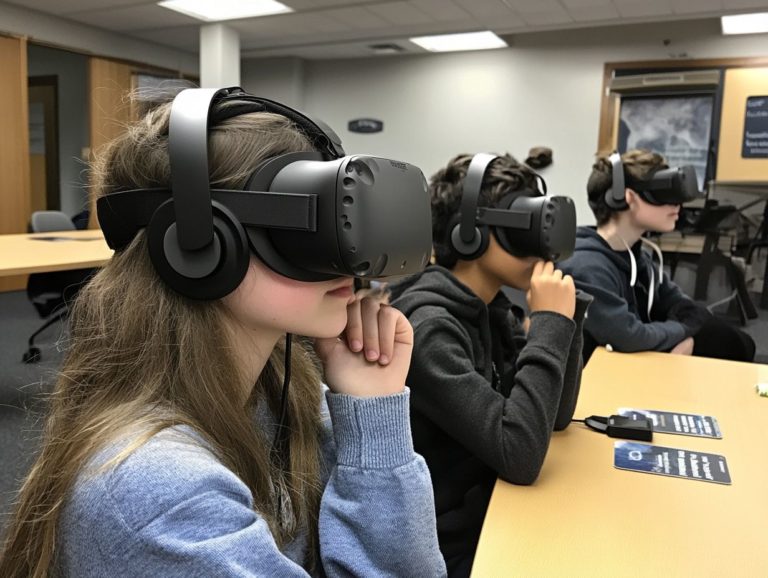5 ways to incorporate games in language learning
Learning a new language can certainly pose challenges, but it doesn t have to be a tedious affair! By integrating games into your language learning routine, you can transform the process into an enjoyable and effective experience.
Consider five innovative methods to leverage games for enhancing your language skills, ranging from cutting-edge language learning apps to imaginative board games.
You ll discover the benefits of gamification, which is the use of game-like features in learning, how it supports vocabulary expansion, and tips for hosting captivating language learning game nights.
Get ready to make your language learning journey exciting and fun!
Contents
- Key Takeaways:
- 1. Use Language Learning Apps
- 2. Play Vocabulary Games
- 3. Incorporate Role-Playing Games
- 4. Create Language Learning Board Games
- 5. Host Language Learning Game Nights
- What Are the Benefits of Using Games in Language Learning?
- How Can Games Help with Vocabulary Building?
- Ready to level up your language skills while having fun? Let’s explore some exciting ways to use games in learning!
- What Are Some Examples of Role-Playing Games for Language Learning?
- How Can Board Games Be Adapted for Language Learning?
- What Are Some Tips for Hosting a Successful Language Learning Game Night?
- How Can Games Be Incorporated into Traditional Language Learning Methods?
- Frequently Asked Questions
- What are some benefits of incorporating games in language learning?
- How can I incorporate games in language learning?
- What are some examples of language learning apps that incorporate games?
- Can board and card games be used for language learning?
- How can role-playing activities be beneficial for language learning?
- What kind of language learning challenges can be incorporated in games?
Key Takeaways:

Start making language learning fun and engaging today by using language learning apps and playing vocabulary games. You can also explore how to use online games for language acquisition to improve speaking skills and cultural understanding by incorporating role-playing games into language learning. Create interactive and personalized learning experiences by designing language learning board games.
1. Use Language Learning Apps
Language learning apps make it easy to learn in a fun and interactive way, while also providing essential tools to improve your skills.
These digital platforms come packed with a range of features, from flashcards that help you retain vocabulary to entertaining games that make grammar practice a breeze.
Find apps that match your learning style easily, whether you lean towards visual aids or prefer auditory exercises, making language acquisition feel not just manageable, but enjoyable.
These apps also include cultural lessons and global perspectives, enriching traditional learning methods and giving you valuable insights into diverse customs and practices. This approach boosts your language proficiency and broadens your understanding of the world, enabling you to connect across barriers with newfound ease.
2. Play Vocabulary Games
Engaging in vocabulary games presents an excellent opportunity to enhance your language skills in an enjoyable and interactive manner. These activities allow you to develop your vocabulary while immersing yourself in fun challenges.
You ll find these games come in a variety of formats, such as spelling challenges and matching exercises, all crafted to encourage your active participation.
For example, spelling games offer a lively environment where you can practice word formation and pronunciation, while matching games sharpen your ability to connect words with their meanings or images.
By integrating such playful activities into your language learning, you make learning enjoyable and reinforce vocabulary retention. The dynamic nature of these games keeps you focused and motivated, ultimately leading to greater language proficiency and confidence.
3. Incorporate Role-Playing Games
Incorporating role-playing games into your language instruction opens up a world where you can practice grammar and pronunciation within an immersive context. This approach fosters your creativity and enhances your overall language skills through engaging storytelling and interactive scenarios.
As you dive into these imaginative play sessions, you effectively simulate real-life situations, promoting spontaneous communication and a deeper understanding of culture. These games invite you to explore various characters and narratives while also requiring collaboration, nurturing essential team dynamics along the way.
By navigating challenges and solving problems together, you sharpen your critical thinking skills, enhancing your ability to articulate thoughts and emotions in a new language. Integrating role-playing games into your curriculum transforms the typical learning experience into an exciting journey of exploration and connection.
4. Create Language Learning Board Games

Create language learning board games. They blend competition with teamwork and invite you to develop your language skills collaboratively.
By incorporating elements like vocabulary challenges, grammar quizzes, and interactive storytelling, these games transform traditional rote learning into captivating experiences. You ll find yourself actively engaged in your learning journey, often immersed in scenarios that demand real-time application of your language skills.
The dynamic nature of board games promotes individual achievement and encourages social interaction. You and your peers can practice and reinforce your understanding together.
This delightful mix of fun and education encourages you to retain language concepts in ways that textbooks often fall short of achieving.
5. Host Language Learning Game Nights
Hosting language learning game nights offers a fantastic opportunity to enhance engagement and collaboration among students and their families. This transforms language instruction into a delightful experience filled with enjoyable activities and educational tools.
These gatherings serve as a vibrant platform for practicing new vocabulary and grammar. They encourage participants to collaborate, fostering essential teamwork skills.
Choose games that challenge players to think creatively and communicate effectively in the target language. Everyone can elevate their linguistic abilities while sharing in the fun.
Create a safe and welcoming atmosphere to boost participation. This nurtures a community that values global-mindedness and cultural exchange.
What Are the Benefits of Using Games in Language Learning?
The benefits of incorporating games into language learning are remarkable. You’ll find enhanced communication skills, improved critical thinking, and heightened engagement among students, making the entire learning process enjoyable and effective. For example, try out these fun ways to practice language speaking skills to further enhance the experience.
Weaving interactive play into your lessons helps learners retain vocabulary with ease. The context of games reinforces word usage through repetition, all within a fun and engaging environment.
Your students’ fluency can significantly improve as they dive into real-time conversations during games like role-playing or board games. Formats such as Pictionary and charades spark teamwork skills and inspire creativity, breaking down language barriers and cultivating a sense of community.
These strategies work wonders in classrooms, making language learning a thrilling journey for everyone!
How Can Games Help with Vocabulary Building?
Games are an exceptional tool for building your vocabulary. They offer an engaging and enjoyable way to enhance your language skills while immersing yourself in fun activities that promote retention.
These games often include competition, time constraints, and score tracking, which ramp up your motivation and cultivate a vibrant learning environment.
For instance, word puzzles and flashcard challenges can transform tedious memorization into an exhilarating experience. Collaborative games encourage teamwork, reinforcing vocabulary through rich social interaction.
Mechanics like level progression and immediate feedback ensure that you repeatedly encounter new words, promoting a deeper understanding.
By transforming vocabulary acquisition from a mundane task into an exciting adventure, these games significantly enhance long-term retention and help you internalize new terminology.
Ready to level up your language skills while having fun? Let’s explore some exciting ways to use games in learning!
What Are Some Examples of Role-Playing Games for Language Learning?

Examples of role-playing games for language learning immerse you in scenarios that allow you to practice real-life conversations. This enhances your creativity and storytelling skills while boosting your language proficiency.
Take games like ‘The Sims’, for instance. They invite you to create characters and engage in daily life activities, offering a playful way to practice vocabulary related to housing, relationships, and careers.
Similarly, ‘Dungeons & Dragons’ helps you work together and talk with each other as you navigate intricate narratives. This can significantly enhance your grammar and pronunciation in a lively setting.
Role-playing also helps you understand different cultures by presenting authentic contexts where language is actively used. This exposure provides valuable insights into the norms and values of various regions, adding depth to your learning journey and making it both enjoyable and enriching.
How Can Board Games Be Adapted for Language Learning?
Board games can be creatively transformed into powerful tools for language learning by weaving language objectives into the gameplay mechanics. This approach enhances the educational value of the games and helps players work together and talk with each other.
For educators eager to elevate language acquisition in their classrooms, the journey begins with selecting games that boast flexible structures think Scrabble or Pictionary. By making slight modifications to the rules, you can encourage players to define words, construct sentences, or even use new vocabulary that aligns with their studies.
Cooperative board games create an environment where students engage in discussions about strategies and share their ideas. This seamlessly integrates the target language into their interactions and reinforces vocabulary through contextual usage while promoting critical thinking skills and active participation.
The result? A dynamic and engaging learning experience that keeps students invested and eager to communicate.
What Are Some Tips for Hosting a Successful Language Learning Game Night?
Hosting a successful language learning game night involves finesse and careful planning to ensure maximum engagement. Start by selecting games that are both enjoyable and educational, creating an inviting environment where everyone feels welcomed and involved.
Begin the evening by curating a diverse list of games tailored to various skill levels, ensuring inclusivity for all participants. Opt for games that promote teamwork and communication; this encourages guests to talk with each other in a relaxed and friendly setting.
Child safety is paramount, so choose age-appropriate games and arrange the space to minimize any potential hazards. Throughout the night, integrate language objectives into the activities by prompting discussions and encouraging the use of vocabulary related to the games.
This approach fosters a natural learning atmosphere where participants engage and collaborate seamlessly while having fun.
How Can Games Be Incorporated into Traditional Language Learning Methods?
Incorporating games into traditional language learning methods significantly enriches your educational experience, making it interactive and engaging while reinforcing essential language skills. To further enhance your learning, consider these 7 ways to integrate language learning into daily life.
This innovative approach gives you the power to strike a balance between time-honored techniques and modern game-based learning. For instance, imagine your language classroom utilizing role-playing games to simulate real-life conversations. This allows you to practice pronunciation and vocabulary in a dynamic and immersive setting.
Similarly, platforms like Duolingo incorporate gamified elements think rewards and levels to keep you motivated. This ensures that you enjoy the learning process while achieving your language proficiency goals.
These examples highlight the effectiveness of merging traditional teaching practices with game mechanics, fostering a holistic educational environment that caters to your unique learning style.
Frequently Asked Questions

What are some benefits of incorporating games in language learning?
Games make language learning fun and engaging. They also improve memory, boost problem-solving skills, and increase motivation.
How can I incorporate games in language learning?
You can include games in language learning in five ways. These are language apps, board or card games, role-playing, challenges, and creating your own games.
What are some examples of language learning apps that incorporate games?
Popular language apps with games include Duolingo, Memrise, Rosetta Stone, and FluentU. These offer interactive games to improve your language skills.
Can board and card games be used for language learning?
Absolutely! Board and card games are excellent tools. Games like Scrabble and Bananagrams improve vocabulary while Codenames and Taboo enhance communication.
How can role-playing activities be beneficial for language learning?
Role-playing activities let learners practice language in real-life situations. This enhances conversational skills and builds confidence.
What kind of language learning challenges can be incorporated in games?
Language challenges can include crosswords, storytelling with specific vocabulary, or immersion experiences. These activities make learning exciting and interactive.






